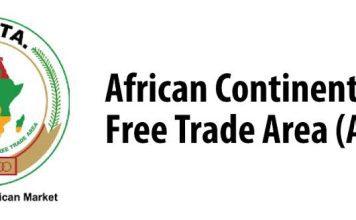Nigeria is to commence a formal export of locally produced goods to South Africa, Rwanda, Cameroon and Kenya from April next month under the monitored Trade Initiative of the African Continental Free Trade Area, as disclosed by the national centre of AFCFTA on Thursday.
Businesses in Nigeria currently run some export trades to these countries, they make such exports informally, but henceforth, Nigerian companies would start the official and formal export of commodities to African nations under the AfCFTA agreement.
The AFCFTA is a free trade treaty founded among 54 of the 55 African Union Nation, creating the largest free trade area in the world following the number of participating countries.
A Stakeholders Workshop on the AfCFTA Digital Trade Protocol held in Abuja on Thursday, Olusegun Awolowo, the Executive Secretary, National Action Committee on AfCFTA, told the Newsmen that through trading under the main AfCFTA had yet to start, the secretariat of the programme had introduced the Guided Trade Initiative.
He added, “We haven’t started trading in AfCFTA, we are duly going through the protocols. But recently the AfCFTA secretariat itself launched what they call the Guided Trade Initiative to get some countries to start trading outside their regional blocks.
“We’ve signed onto it and I think that by the end of April we are taking a few companies, big, medium and small enterprises to actually launch trading in Africa. All we are doing now is that we are going through and signing all the protocols, as well as finding a way on how to implement them.
“So we are now at the stage of implementation. Therefore, trading hasn’t really commenced under AfCFTA. It is not an overnight thing, you have to go through all the protocols, sign them and agree.
“However, we are hoping that we are able to start trading under the GTI, not on the main AfCFTA itself, by the end of April. So it will be on record that Nigeria has now started exporting officially and formally, because, of course, informal trade is going on anyway.”
Asked to mention some of the countries that had also signed onto the GTI scheme which Nigeria would formally start exporting products to, Awolowo replied, “We are going to South Africa, Kenya, Cameroon and Rwanda. This is under the Guided Trade Initiative that was brought by AfCFTA, knowing that trade agreements take long.
“In fact, this AfCFTA is the fastest one. How long did it take the World Trade Organisation to get on ground? They are still signing protocols up till today. But this is fastest one and to fast-track it, that is what the GTI is all about.
“It is an initiative that enables countries to chose. Let’s take the companies and let them actually export from the various ports. Then we test the capacities of the ports, test the capacities of the shipments and the capacities of cargoes. Then the private sector can fully buy into it. So that’s what is going to happen.”
Having been founded in March 2018, the AfCFTA became successful on May 30, 2019, with the goal to promote intra-African trade, foster economic development and create a larger, more competitive African market.
The advantages of the agreement include; a better standard of living, increased trade and investment opportunities, creation of jobs, improved economic diversification and transformation
It also, has some challenges which include the difficulty in the implementation of trade facilitation measures, addressing infrastructure gaps, and building productive capacity.
Experts say the AfCFTA has the prospective to be a game-changer for Africa, but its success will depend on overcoming these challenges and ensuring all member states can participate effectively.
Speaking about the workshop, Awolowo stressed that the adoption of the AfCFTA Digital Trade Protocol marked a significant milestone in the journey towards economic integration and digital transformation.
“It signifies our collective commitment to leveraging digital technologies to enhance intra-African trade, foster innovation, and drive sustainable economic growth.
“In the wake of this landmark achievement, it is imperative that we equip ourselves with the requisite knowledge and resources to seize the opportunities that lie ahead. Trade is competitive!
“The digital economy holds unparalleled potential to empower our youth, unleash their entrepreneurial spirit, and facilitate their meaningful participation in the global marketplace.”
Furthermore, Special Assistant to the President on Legal, Research and Compliance Matters in the Office of the Vice President, Bashir Maidugu, urges the government to get the youths involved in AfCFTA Digital trade.
“Nigeria is the largest market in Africa and we are leading in the digital e-commerce space, but what the government is advised to do is to encourage the youths and other professional bodies to utilise the opportunity of the AfCFTA to boost the Nigerian economy.
“So the government will have to pay more attention to Nigerian youths, who are already dominating in Africa, for example, Flutterwave, Konga, Jiji and so many other online stores and fintech payment System
“The government can be more active in developing the skills of these youths who are the driving force for digital trade. So the attention could be by funding universities and other research institutes and e-learning centres. This is to ensure that we maintain our dominance and add more,” Maidugu noted.
